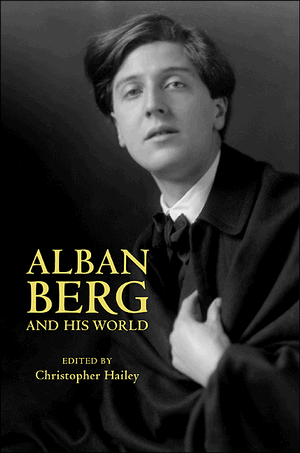BARD COLLEGE’S ANNUAL SUMMERSCAPE PROGRAM ran for two intensive weekends (Aug. 13-22) and this year featured the music of everybody’s favorite inaccessible composer, Alban Berg. But here’s where the “ ... and His World” part came into skillful play. We heard music of such Berg contemporaries as de Falla, Korngold and Gershwin, so hummable tunes cropped up from time to time.
 More than that, each concert has an accompanying talk that helps contextualize the music. I attended the Saturday events during the second weekend, and thus missed any lecture that might have helped with the business of listening to atonal stuff, but I’ve been a Berg fan since I discovered his opera Wozzeck as a moody and disenfranchised teen, when murderous rages and possible self-destruction seemed entirely reasonable possibilities, and the clangier the soundtrack the better.
More than that, each concert has an accompanying talk that helps contextualize the music. I attended the Saturday events during the second weekend, and thus missed any lecture that might have helped with the business of listening to atonal stuff, but I’ve been a Berg fan since I discovered his opera Wozzeck as a moody and disenfranchised teen, when murderous rages and possible self-destruction seemed entirely reasonable possibilities, and the clangier the soundtrack the better.The big piece on the second Saturday’s program was Franz Schmidt’s unbelievably overwrought oratorio Das Buch mit sieben Siegeln (The Book of the Seven Seals), a work rarely performed ostensibly because of the composer’s possible Nazi-regime connections, but more probably evading the limelight because it slams you over the head with a passion that’s mostly artifice, the musical version of a painting by Thomas Kinkade.
Which isn’t to say it wasn’t enjoyable. Surrender yourself to its relentless hugeness and you’ve got a non-stop mix of mysticism and terror. The text is drawn from the Book of Revelations, in which wingnuts have wallowed for centuries, so we have imagery of horses and fire and childbirth and end-of-time judgment flung across soloists and chorus and orchestra.
Schmidt showed some masterly techniques of tone painting, using brass and winds with a surprisingly restrained and effective hand from time to time, but he couldn’t resist for very long throwing in the kitchen sink when the text so moved him.
Tenor Thomas Cooley gave a fantastic performance as the narrator, working for most of the piece’s hour and 45 minutes. Given the text, he could come across as something of a scold, but Cooley shaded the part deftly, and paid out a surprising reserve of passion at the climax.
There’s less work for the solo vocal quartet, but soprano Christiane Libor, mezzo Fredrika Brillembourg, tenor James Taylor and bass-baritone Robert Pomakov dug in with sincere gusto, the only way to make a piece like this work.
The Bard Festival Chorale were divided by gender across the front of the stage and got out of sync in a couple of heavy-going places, but otherwise they and the American Symphony Orchestra turned in excellent performances. Overwrought it may have been, but I was glad to experience the piece.
Libor opened the program singing Berg’s “Der Wein,” a brief setting of Baudelaire. Atonal and crunchy, it still displays the lyricism Berg somehow still managed to sneak into his music.
We met tenor Taylor earlier in the day in Hanns Eisler’s “Tagebuch,” part of a program titled “Composers Select: New Music in the 1920s.” Eisler collaborated with Brecht during that decade and beyond, but fled Germany as the Nazis ascended – only to find his refuge in the U.S. shattered by the blacklisting witchhunts that led to his deportation in 1948. His music is underappreciated, and the “Tagebuch” (Day Book, or diary) is a whimsical piece for female trio, tenor, violin and piano sardonically showing the influence of American popular music.
Violinist Miranda Cuckson and pianist Blair McMillen were joined by clarinetist Laura Flax for the Adagio from Berg’s “Kammerkonzert,” trio-arranged by the composer and a lovely way to kick off the program.
The stars of the show undoubtedly were the members of the FLUX Quartet, who played Ernst Toch’s String Quartet No. 11 and Alois Hába’s Quartet No. 2, the latter employing quarter tones in a way that seemed more mischievous than ardent, pulling tonal centers here and there throughout the piece while still achieving a satisfying dramatic structure.
I’ve listened to Manuel de Falla’s Harpsichord Concerto repeatedly over the past few decades, always thinking I’ll enjoy it more the next time. And it always comes off sounding as if the composer too deliberately squelched his natural voice. But soloist Paolo Bordignon put the instrument through its paces – it’s almost all fast arpeggios – and the accompanying chamber ensemble was terrific.
“You Can’t Be Serious! Viennese Operetta and Popular Music” was the title of the 10 AM lecture-demonstration. University of Leeds professor Derek B. Scott was charming and engaging and knew his stuff, taking us along a path of song by Offenbach, Strauss, Lehár and Gilbert and Sullivan, among others.
Tenor William Ferguson gave an effortless performance of Offenbach’s tongue-twisting “Je suis Brésilien,” mezzo Hai-Ting Chinn made Pinafore’s Buttercup much sexier than I thought possible, and soprano Camille Zamora, baritone Thomas Meglioranza and pianist James Bassi rounded out the splendid ensemble.
Relentlessly frothy, filled with solos, duets, ensembles and patter songs, it was a great start to the day.
Berg and His World: Bard College Summerscape Festival, Aug. 21
– Metroland Magazine, 26 August 2010
No comments:
Post a Comment